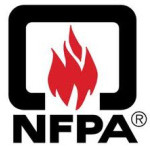- Industry: Fire safety
- Number of terms: 98780
- Number of blossaries: 0
- Company Profile:
Established in 1896, NFPA's mission is to reduce the worldwide burden of fire and other hazards on the quality of life by providing and advocating consensus codes and standards, research, training, and education.
The distance to be maintained between any two operating buildings on an explosives manufacturing site, at least one of which contains or is designed to contain explosives; the distance between a magazine and an operating building.
Industry:Fire safety
The distance, as specified by the manufacturer, from the lowest point of the brow opening at the lateral midpoint of the helmet to the basic plane of the headform when the helmet is firmly positioned on the headform.
Industry:Fire safety
The air distance between Halon 1301 equipment, including piping and nozzles, and unenclosed or uninsulated live electrical components at other than ground potential.
Industry:Fire safety
The distance between the pinch point or point-of-operation and the presence-sensing safety device (PSSD) sensing field that ensures that the operator cannot reach the danger point before the machine comes to a full stop.
Industry:Fire safety
The distance between the floor and the underside of the roof deck within the storage area.
Industry:Fire safety
The distance along the optical axis of the detector at which the detector can detect a fire of specified size and fuel within a given time frame.
Industry:Fire safety
The discharge load in amperes that a battery at 0°F (-17. 8°C) can deliver for 30 seconds while maintaining a voltage of 1. 2 volts per cell or higher.
Industry:Fire safety
The discharge of distinct pockets of air and water or weak foam solution due to the insufficient or uneven mixing of foam concentrate, water, and air in a compressed air foam system (CAFS).
Industry:Fire safety
